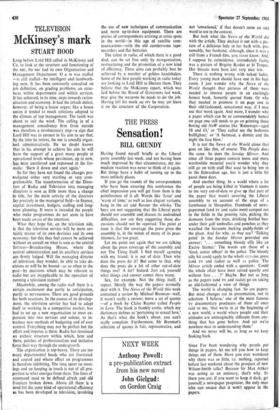McKinsey's mark
TELEVISION - STUART HOOD
Long before Lord Hill called in McKinsey and Co. to look at the structure and functioning of the BBC, the BBC had its own Organisation and Management Department. 0 & xi was staffed —is still staffed—by intelligent and hardwork- ing men. It has been constantly consulted on job definition, on grading problems, on struc- tures within departments and within services. It has achieved, in its time, steps towards ration- alisation and economy. It had the inbuilt defect, however, of being a house organ; like a house union it tended to reach solutions adapted to the climate of top management. The lamb was shorn to suit the wind. The calling in of a management consultancy firm from outside was therefore a revolutionary step—a sign that Lord Hill was in earnest in his aim to see that, by the time he retires, the sac is soundly organ- ised administratively. He no doubt knows that in his attempt to achieve his aim he will have the support of a great many people at operational levels whose pessimism, up to now, ,,bas been unrelieved and expressed in the for- mula : `Burn it down and start again.'
So far they have not found the changes pro- mulgated either very startling or very com- prehensible. The transformation of the Direc- tors of Radio and Television into. managing directors is seen as little more than a change in title, for the main activity of the directors lay precisely in the managerial field—in finance, capital investment, budgets, staffing and long- term planning. If more is intended the people who make programmes do not seem to have been made aware of the intention.
What they hope for, on the television side, is that the television service will be more cer- tainly master of its own destinies and its own economy; but this they feel, cannot be achieved without an assault on what is seen as the central fortress—Broadcasting House, where the central administration and its ancillary services are firmly lodged. Will the managing director of television, they wonder, be able to take de- Cisions or will he be bound—as so often in the past—by decisions which may be relevant to radio but are inapplicable to the operation of running a television station?
Meanwhile, among the radio staff there is a certain excitement due partly to anticipation, partly to nervousness. There are good grounds for both reactions. In the course of its develop- Ment, the television service has had to adapt itself to working in a competitive market, has had to set up a new organisation to meet ex- pansion into two services and colour, to in- troduce new methods of budgeting and of cost control. Everything may not be perfect but the effort and impetus is there. Radio has remained an archaic structure within which, here and thbre, patches of professionalism and initiative force their way through the undergrowth.
The organisation is top-heavy. There are too many departmental heads who are frustrated and soured and whose effect on programmes is therefore inhibiting. The dm; spent on meet- ings and on keeping in touch is out of all pro- portion to what emerges from them. The lines of command need to be defined afresh and old frontiers broken down. Above all there is a need for the same kind of operational efficiency as' has been developed in television,. involving
the use of new techniques of communication and more up-to-date equipment. There are stories of correspondents arriving at crisis spots in the world—in this age of satellite com- munications—with the old cumbersome tape- recorders and flat batteries.
The talent in radio, of which there is a good deal, can be set free only by reorganisation, restructuring and the promotion of a new kind of efficiency. These aims can probably best be achieved by a number of golden handshakes. Some of the best people working in radio today are looking to Lord Hill to liberate them. They believe that the McKinsey report, which was laid before the Board of Governors last week, may give the weapons he needs to do the job. Having left his mark on ITN/ he may yet leave it on the structure of the Corporation.










































 Previous page
Previous page